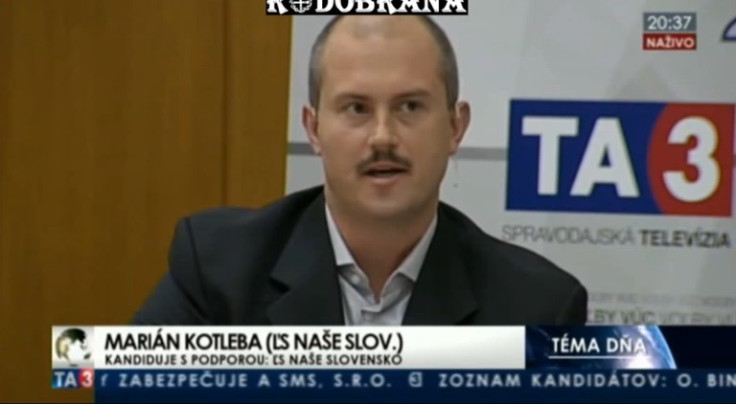Neo-Nazi Party Wins Regional Election in Slovakia

Marian Kotleba, chairman of the right-wing extremist Slovak Togetherness-National Party, is the new lead councillor in the central Slovak region of Banska Bystrica after winning an estimated 55.6% of the vote.
The party Kotleba founded has organised anti-Roma protests and defended the country's past as a Nazi puppet state during World War II. According to a report published by International Policy Analysis, Slovak Togetherness "combines the traditional themes of extreme nationalism, racism, anti-Semitism, neo-fascism and... neo-Nazism."
Kotleba himself, who frequently appears in quasi-military clothing, is a former computer science teacher who has organised marches commemorating the wartime state president Jozef Tiso, who was complicit in the murder of Jews. Kotleba has been charged with racial defamation but denies being a racist:
"Those who do not work should not eat, irrespective of their being white, pink or black."
However according to the Romea website, Kotleba's party programme includes "creating militias, removing Slovakia from the "terrorist Nato pact", establishing social justice, eliminating "privileges, and not just for gypsy parasites", and rejecting "the promotion of sexual perverts".
Although Kotleba apparently won more votes than anyone else in the country, Prime Minister Robert Fico's ruling Smer-Social Democracy Party was the overall victor, winning control in six of Slovakia's eight regions. Fico blamed moderate right-wing parties for Kotleba's success, saying they should have picked a stronger candidate.
The centre right Slovak Democratic and Christian Union - Democratic Party (SDKÚ-DS) won control of capital Bratislava, leader Pavol Freso condemning the neo-Nazi victory in Banska Bystrica as "a huge blow for democracy".
The modern state of Slovakia came into being with the disbandment of the Communist state of Czechoslovakia in 1992. Slovakia's 500,000 strong Roma communities suffer greatly from deprivation and alleged persecution. Recently United Nations High Commissioner for Human Rights (UNHCR) Navi Pillay highlighted a raid by Slovakian police on a shanty town during her address to the UN. However many Slovakians are hostile to the Roma community, accusing them of criminality and a reluctance to integrate - complaints echoed in the UK by former Home Secretary David Blunkett recently following the arrival of Slovakian Roma immigrants in Sheffield.
In the wake of the victory by Kotleba, European Jewish Congress President Dr. Moshe Kantor has called on European officials to launch an action plan to reverse the momentum achieved by neo-Nazi political parties in Europe.
"Democracy has to fight back and European officials should immediately create a plan of action, including the proscription of neo-Nazi political parties, to deal with this phenomenon before it is too late. We hope the Greek model of suspending state funding for the Golden Dawn party, and the revocation of parliamentary immunity for its members will be enacted elsewhere in Europe and form the basis of the opposition."
© Copyright IBTimes 2024. All rights reserved.






